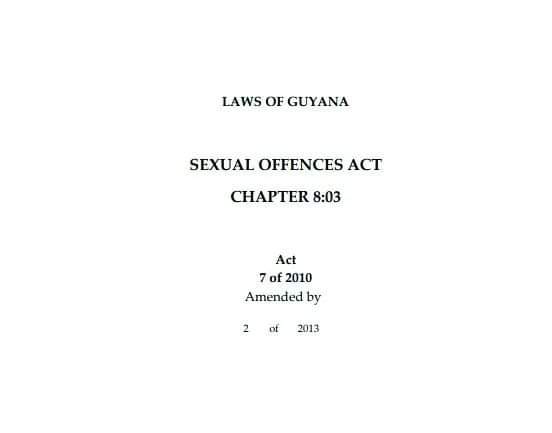The Government of Guyana has released an amended Sexual Offenses Act (2024) for public consultation. The Bill aims to update and strengthen the 2010 law by introducing several significant modifications designed to enhance legal protections and streamline judicial processes for sexual offenses.
Among the key changes to the bill is the admissibility of written statements. Section 43A allows written statements to be admitted as evidence to the same extent as oral testimony, under specific conditions. This change is expected to facilitate the use of documentary evidence in trials, particularly in situations where witnesses are unavailable due to death, illness, or other valid reasons.
Another key amendment includes provisions to better protect child witnesses. Changes to Section 56 mandate the use of video-recorded statements for children in all matters, including sexual offenses. This measure aims to reduce the trauma faced by child witnesses and ensure their testimonies are preserved accurately and respectfully, without need for repetition.
Additionally, Section 62A introduces a prohibition on publishing or broadcasting information that could identify an accused person, unless they are formally charged. This will prevent the tarnishing or reputations of someone that is potentially falsely accused.
A major development in the amended act is the establishment of a National Sex Offender Database, managed by the Commissioner of Police. This database, introduced in a new part—IXA, will maintain detailed records of sex offenders and will be accessible to certain officials working with children and disabled persons.
The database aims to enhance monitoring and prevent reoffending by maintaining comprehensive information on offenders. Moreover, the act includes procedures for post-release monitoring of sex offenders. It details the requirements for notifying the police about the release of sex offenders from prison and ensuring they report to the nearest police station upon their release. This system is designed to facilitate continuous monitoring of offenders and ensure community safety.
The Bill also has key changes in definitions to clarify roles and responsibilities within the judicial system. The new definitions include terms such as “Chief Immigration Officer,” “Commissioner of Police,” “Commissioner of Prisons,” and “designated officer.” These additions aim to provide clear legal frameworks for handling sexual offenses. The amendment document also defines “enterable offence” and “registered sex offender,” ensuring that all parties involved in the legal process have a clear understanding of these crucial terms.
The power of the Director of Public Prosecutions (DPP) has been expanded with the addition of a new section, 41A, which empowers the DPP to remit cases back to magistrates for summary trial if deemed appropriate. This provision allows the DPP to ensure that cases are handled at the appropriate judicial level, potentially speeding up the legal process for certain offenses.
Another noteworthy addition is the criterion for the admissibility of recent complaints outlined in Section 72A. This section emphasizes the need for spontaneous and prompt reporting by victims, aiming to enhance the credibility of victim statements in court by ensuring that complaints are made without undue influence.
The amended law also imposes a duty on officers of state and non-state institutions to report offenses against children and vulnerable adults to the police, as detailed in Section 86A. Failure to report can result in significant fines, highlighting the government’s commitment to protecting these vulnerable groups.
The government has invited the public to submit their comments and suggestions on the proposed amendments to ensure that the final legislation reflects the needs and concerns of all stakeholders. This consultation process is part of a broader effort to strengthen the legal framework around sexual offenses and provide better protection and justice for victims.
For those interested, the amended legislation can be viewed here: [https://mola.gov.gy/bills/THE SEXUAL OFFENCES (AMENDMENT) BILL 2024.1716843811.pdf](https://mola.gov.gy/bills/THE%20SEXUAL%20OFFENCES%20(AMENDMENT)%20BILL%202024.1716843811.pdf “”)













